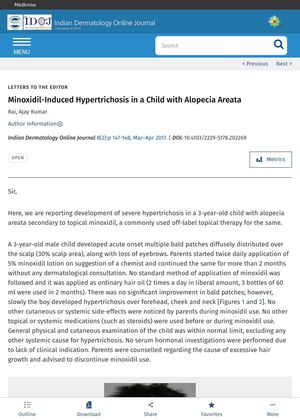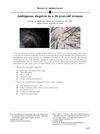Minoxidil-Induced Hypertrichosis in a Child with Alopecia Areata
January 2017
in “
Indian Dermatology Online Journal
”

TLDR A child used a hair growth lotion for hair loss, but it caused excessive hair growth on his face and neck instead.
In 2016, a case was reported of a 3-year-old male child who developed severe hypertrichosis (excessive hair growth) after using 5% minoxidil lotion for alopecia areata (hair loss). The parents applied the lotion twice daily for over 2 months without any dermatological consultation, using it like ordinary hair oil. The child's hair loss did not significantly improve, but he developed hypertrichosis on his forehead, cheek, and neck. No other side effects were noticed. Minoxidil, originally an antihypertensive drug, is used for alopecia and affects hair growth through various mechanisms. However, its efficacy in alopecia areata has not been definitively proven. The report suggested that due to the higher chances of adverse effects, the use of topical minoxidil should be discouraged in children. If necessary, a lower concentration (2%) in gel-based formulation should be used due to relative safety. The report also recommended restricting over-the-counter sales of minoxidil.







